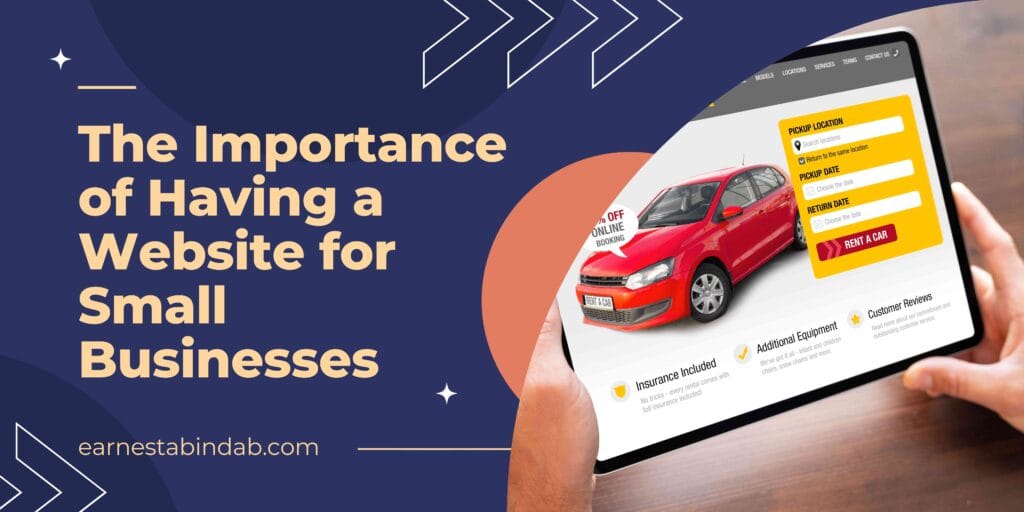A website is essential for small businesses in today’s digital age because it helps them create their image and reach potential clients more effectively. Let’s focus on the following main aspects:
- The reasons why small business owners need a website
- The primary benefits of having a good website
- A step-by-step guide on developing a website
- Tips on how to maintain a website
- Affordable solutions and the reasons why investing in a website is crucial for long-term business growth.
Why Do Small Businesses Need a Website?
Establishing Online Presence
Having a professionally designed and developed website is the first step towards online exposure and presence. It enables customers to search for and get information about your business at their convenience through the Internet.
Building Credibility and Trust
A professional website significantly enhances trust with potential customers. Many consumers perceive a business without a website as less credible. A well-designed site with testimonials and clear information enhances customer confidence in purchasing from a business.
Expanding Our Reach
Websites help your business to reach customers from far away. Good websites can draw visitors from across the globe. Through search engines or social media, opportunities multiply. This online presence is vital for your growth.
Showcasing Products and Services
It offers an effective way of presenting products and services through photos, descriptions, testimonies from users, and virtual tours that cannot be attained using conventional advertising techniques.
That being said, here are some of the most crucial advantages of owning a small business website:
Benefits of Having a Website for Small Businesses
Lead Generation and Increasing Sales
With websites, customers can find you when searching online for your products or services, generating more leads and sales that you would have failed to capture without an online presence.
24/7 Accessibility
A physical store may close at 5 PM, but a website remains accessible 24/7. This means people who might be interested in your business can find out about it and buy things at any time. This flexibility can significantly increase your sales opportunities.
Data Collection and Analysis
A website’s analytics feature enables tracking of user behavior, enabling businesses to understand visitor discovery, lingering pages, and product interests, providing valuable insights for informed business strategy decisions.
Competitive Advantage
Many small businesses still lack an online presence. By having a website, you can distinguish yourself from competitors who are using outdated methods. A professional website can give you a significant edge, helping you attract tech-savvy customers looking for convenience and efficiency.
Key Features of an Effective Small Business Website
Responsive Mobile Design
As customers increasingly engage with mobile devices, a mobile-friendly layout expands accessibility and customers experience on the site.
Value-Driven Content
Good writing, compelling content, and appropriate images must inform and persuade the site’s visitors.
Easy Navigation
The use of links and subheadings enables visitors to quickly access the content or section they are looking for. Sitemaps, menus, and internal links all contribute to this.
Contact Information and Call-to-Actions
Always make customer access to you simple. Clearly display your contact information prominently and encourage visitors to take action with well-defined calls to action. Phrases like “Get in Touch,” “Shop Now,” or “Learn More” direct consumers toward their next steps.
Steps to Create a Website for Your Small Business
Goals/Target:
Determine its purpose and the target market that it will cater to and serve. This set a framework for how design and content should be done.
Choose the Domain and Web Hosting Provider
Domain names impact findability. Select suitable web services based on the type of servers, speed, security, and backups, and choose website hosting according to the business’s requirements.
Design and Develop Website
You don’t need to know a lot about programming to make a great website! To get started quickly, use website builders that come with themes. However, if your income allows it, you could hire a professional. Remember to make sure that the designs you choose are in line with your business.
Optimize for SEO and Mobile
Ensure you write the content according to SEO guidelines for creating meta titles and descriptions so that customers can find your website on search.
Tips for Maintaining a Successful Small Business Website
Regularly Update Content
Keeping your site current is vital. Regular updates not only keep your visitors engaged but also help improve your search engine rankings. Add blogs, update service information, and showcase new products regularly.
Track Performance Using Analytics
Website traffic and sales funnels, like bounce rates, the number of pages viewed, and the sources of traffic, help us figure out how well a website works and where it might be improved.
Engage with Customers through the Website
Exchange information through live chats, FAQs, Contact Us, or similar sections. Provide the viewers with newsletter subscriptions or create online communities to keep them engaged for a longer period and increase conversion.
Cost-Effective Solutions for Building a Website
Building a website can be affordable. There are various platforms such as WordPress, Wix, and Squarespace that offer affordable plans to get you started. These solutions typically come with user-friendly tools and templates, making it easier for anyone to set up a website without deep technical know-how.
Conclusion
Small businesses today rely on their websites as essential tools for expansion, revenue, and viability. An authoritative, user-friendly website optimizes access to the market and converts new customers at various times. Businesses must focus on crafting content that targets buyers and optimizing their websites to ensure comprehensive market access and customer conversion. Therefore, if you haven’t leaped yet, now is the moment to invest in your future. Let your website serve as a gateway to your business’s success.

